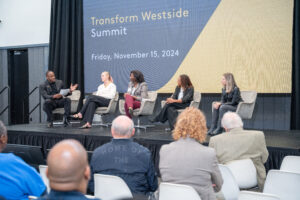The November 15 Transform Westside Summit brought together community leaders, housing advocates and residents to discuss collaborative solutions to affordable housing in Atlanta’s Historic Westside. Under the theme “Building Foundations,” the Summit emphasized the importance of partnerships in addressing housing challenges while preserving the character and legacy of the community.
John Ahmann, Westside Future Fund President and CEO, and Ebony Ford, an English Avenue resident, opened the event and welcomed attendees. Tolton Pace, Senior Program Officer for Atlanta’s Westside at the Arthur M. Blank Family Foundation, led the devotion.
The event featured a panel moderated by Derrick Jordan, President, Anothy Development, LLC, Real Estate Contractor and former Board Member for WFF. Panelists highlighted key themes shaping their work, focusing on partnerships, strategic investments and community-centered solutions. Panelists included:
- Rachel Carey, Chief Real Estate Officer, Westside Future Fund
- Candice Jordan, Chief Development Officer, Atlanta Habitat for Humanity
- Ashani O’Mard, Senior Vice President of Strategic Housing Investments, Atlanta Neighborhood Development Partnership
- Amanda Rhein, Executive Director, Atlanta Land Trust
Key Themes from the Conversation
Partnerships and Community Impact
“Atlanta is a group project…There’s no way that’s more true than here on the Westside.” Rachel Carey
Collaborative efforts among organizations are driving meaningful change in Atlanta’s housing landscape. These partnerships have collectively enabled the construction, preservation and affordability of hundreds of housing units, ensuring community resilience.
- Atlanta Neighborhood Development Partnership (ANDP) partners with institutional investors to identify, purchase and rehabilitate single-family homes, bringing them back into the market as affordable housing.
- Westside Future Fund (WFF) collaborates with Quest Communities, Atlanta Housing and other partners to create affordable housing units aligned with community retention guidelines.
- Atlanta Land Trust (ALT) was founded through a coalition led by the Atlanta BeltLine Partnership, the Annie E. Casey Foundation, and community developers to preempt displacement and foster neighborhood stability.
Strategic Housing Investments and Partnership Models
“The community land trust model removes land from the speculative real estate market and puts it into community control for community benefit.” Amanda Rhein
Panelists emphasized leveraging innovative tools and financial models to create and preserve affordable housing.
- ANDP scales its impact by acquiring properties from institutional investors at discounted rates, rehabilitating them and reintroducing them as affordable homes or rentals.
- WFF’s Anti-Displacement Tax Fund provides financial support to offset rising property taxes for long-time residents, preserving homeownership and community roots.
- Habitat for Humanity utilizes 0% mortgage programs, reducing housing costs to an average of $700-$800 per month, enabling homeowners to invest in education, business ventures and generational wealth.
Collaborative Approach to Affordable Housing
“Because we’re able to engage volunteers, it helps keep our homes affordable… we save about $40,000 per build, and those savings are passed on to homeowners.” Candice Jordan
The panel showcased how collective action fosters meaningful, measurable outcomes.
- WFF’s goal of creating 1,500 affordable housing units by 2027 reflects the power of coordinated efforts.
- ALT’s land trust model ensures that homes remain permanently affordable, protecting against market volatility.
- Habitat for Humanity and other organizations are embedding anti-displacement principles into development projects, ensuring that affordability benefits communities over the long term.
Addressing Displacement and Long-Term Affordability
“It’s about giving residents a choice to live within the neighborhood they’ve worked in, celebrating and strengthening it for the future.” Ashani O’Mard
Displacement remains a central challenge, especially in rapidly gentrifying areas. Panelists shared strategies to protect vulnerable residents. These approaches not only create affordable housing but also address the root causes of displacement by offering stability and fostering generational wealth.
- ALT focuses on providing affordable homeownership opportunities to legacy residents at risk of being priced out of their neighborhoods.
- ANDP’s wealth studies revealed that homeowners in their program generated an average of $135,000 in equity, offering stability and wealth-building opportunities that renting could not.
- Habitat for Humanity has built or preserved over 150 homes in English Avenue and Vine City, ensuring residents can stay in their communities.
Miss the event? Watch the full Transform Westside Summit on YouTube.

